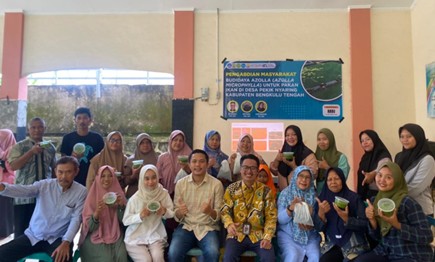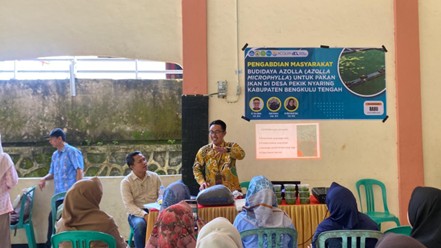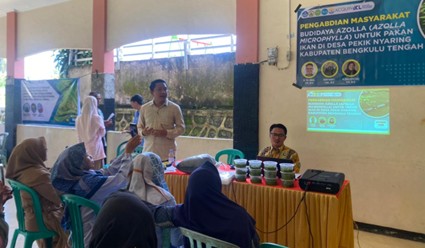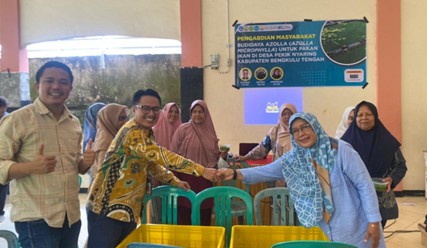
Marine Science Lecturers at the University of Bengkulu Develop Azolla Cultivation with the Community for Fish Feed in Pekik Nyaring Village
Central Bengkulu, October 15, 2025 – A team of lecturers from the Marine Science Study Program, Faculty of Agriculture, University of Bengkulu carried out community service activities in Pekik Nyaring Village, Pondok Kelapa District, Central Bengkulu Regency. This activity focused on the cultivation of Azola (Azolla microphylla) as a natural and environmentally friendly feed for freshwater fish. The team of lecturers involved in this activity consisted of Dr. Yar Johan, M.Si, Ayub Sugara, S.Kel., M.Si, and An Nisa Nurul Suci, M.Si. This community service program aims to improve the knowledge and skills of village communities in utilizing local resources to support sustainable and cost-effective fish farming.
During the event, a team of lecturers provided technical training on azolla cultivation, from pond preparation and selection of superior seeds to harvesting and processing azolla as fish feed. The activity also involved local fish farming groups who enthusiastically participated in each training session.
According to Dr. Yar Johan, M.Si., the development of Azola has great potential because this aquatic plant contains high protein (around 25–30%) and is easy to cultivate in tropical environments like Bengkulu.
“Azola can be a solution for fish farmers to reduce the currently high cost of feed. Furthermore, this plant is environmentally friendly and can improve pond water quality,” said Dr. Yar Johan. Meanwhile, Ayub Sugara, S.Kel., M.Si., added that this community service activity demonstrates the university’s role in supporting food and economic independence in coastal and rural communities.
“We hope that activities like this can strengthen the relationship between the campus and the community, and encourage the implementation of simple technologies with high economic value,” he explained.
The Head of Pekik Nyaring Village, Mr. Noval Ananta, S.H., M.H., expressed his appreciation for the program, which directly benefits the residents. He expressed his hope that the University of Bengkulu’s support would continue to optimize the results. The program concluded with a field demonstration and the distribution of Azola seeds to a local fish farming group. Through this initiative, Pekik Nyaring Village is expected to become a model for a self-sufficient fish food village that utilizes the potential of local natural resources and supports low-carbon and sustainable development programs in Bengkulu Province.







